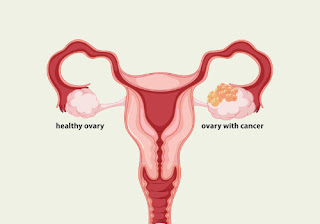9 Early Warning Signs of Ovarian Cancer the Silent Killer

Are you looking for early warning signs of ovarian cancer the silent killer? One should analyze the body for the occurrence of frequent symptoms, which might be an indication of a bigger problem. It is possible to identify deadly diseases early and overcome their condition before it turns severe and fatal. The people have to be vigilant. Ovarian cancer is no different.
Ovaries lie deep inside the abdomen, and physical changes are difficult to see; only the symptoms that it produces should be taken seriously and investigated. Mostly pronounced symptoms develop only after the enlarged ovaries affect the other organs.
Warning Signs of Ovarian Cancer the Silent Killer

Here we present to you 9 early warning signs of ovarian cancer you should not ignore
1. Bloating
This is often the most ignored symptom, taking it for granted because of bad eating habits. People often get it confused with premenstrual syndrome.
Bloating is an indication of enlarged ovaries. Your tummy size increases to accommodate the larger ovaries.
2. Back, Pelvic or Abdominal Pain
Women who have ovarian cancer will have fluid in the abdomen, which causes lower back pain. Also, when the tumor has spread to the pelvic region, severe back pain, which affects day-to-day activity, is often seen.
Back pain that is not associated with any activity is frequent. You should immediately consult a doctor as it might indicate tumors in the ovary and pelvic region. It produces pressure on the lower back and pelvic area.
3. Loss of Appetite and Weight Loss
The abnormal buildup of fluid in the abdomen due to ovarian cancer produces a feeling of fullness. The hunger reduces drastically, and the accumulated fluid creates a bloated feeling.
You will quickly feel full as soon as you start eating. It also causes constipation, and the patient tends to lose weight drastically.
4. Cramping
During their normal menstrual cycle, women often experience cramps, and the occurrence of cramming psi taken for granted a sit is part and parcel of their womanhood.
But the occurrence of persistent cramps should be taken as a warning symptom. Indigestion or Upset Stomach: The upset abdomen sends various ovarian cancer signals, one of which is heartburn.
An upset stomach makes you feel nauseated all the time. If you think there is heartburn without any specific reason and are on an excellent tummy-friendly diet, seek professional help to identify the underlying cause.
5. Increased Urge to Urinate
The ovarian cancer cells or the abnormally fluid accumulated fluid compress the bladder, urging to urinate. When the women go to pee, nothing comes out.
Your bladder isn’t full of urinating. It is only the pressure on the bladder that signals to pee. Women often ignore this symptom as an indication of urinary tract infections, and antibiotics will not be of any use. Your frequent toilet trips will be exhausting and embarrassing!
6. Increased Abdominal Girth
Your waist region tends to grow bigger without any specific reason. The stomach seems to be bloated all the time.
Your feeling of fullness and indigestion makes you understand it as a digestive problem, while the reason would be increased ovarian size.
7. Unexplained Exhaustion
Women tend to feel tired for no reason. There will be difficulty breathing as ovaries suppress the lungs, making it difficult o exhale and inhale. The frequent fatigues make it challenging to perform daily chores.
8. Painful Sex
This can be due to either vaginal dryness or the tumor has made an entry into the vagina. The hormonal changes cause the vagina to dry, resulting in discomfort during sex.
The cancerous growth of ovaries can start pushing into the vagina; hence, having sex will be very painful.
9. Menstrual Changes
The frequency of menstruation increases. The normal cycle will be disrupted. Even in postmenopausal women, the period starts due to the abdominal production of hormones, and it looks like menstrual bleeding.
The periods will be like regular periods with all their cramps and abdominal pain. Depending upon the individual, the bleeding will be either heavier or irregular.
How to Prevent Ovarian Cancer
Several contributing factors can put you at risk of ovarian cancer, including age, genetics, mutations, endometriosis, women who had breast, uterine, or colorectal (colon) cancer, etc.
There is no straight way to prevent ovarian cancer, but the following measures can help you
- Birth control pills reduce the risk of ovarian cancer
- Women who have given birth to several children are less likely to develop it
- Tubal ligation (the procedure to tie fallopian tubes)
- The surgical removal of ovaries is also done for women who are at risk
A healthy diet and exercise are key to the prevention of diseases, including ovarian cancer
Early Detection of Ovarian Cancer
Early detection of cancer helps you treat the disease, and survival rates will be higher. The early warning signs of ovarian cancer should be analyzed. The following tests should be performed if any of the tests are positive, consult a gynecologic oncologist.
1. Pelvic exam
Rectovaginal exam should be done annually to examine for abnormal growth.
2. Transvaginal Sonography
This vaginal ultrasound is performed if there is any abnormality in the pelvic exam. It is also performed in women at increased risk of ovarian cancer.
3. CA-125 Test
CA-125 is a protein commonly produced by cancerous ovarian cells. The test is performed on women at high risk or who have an abnormal pelvic examination.
A positive CA-125 need not necessarily indicate ovarian cancer; certain other disease conditions also cause CA-125 to increase.
Ovarian cancer symptoms are often misleading women might think it is a part of the normal menstrual cycle, urine infection, indigestion, constipation, increased abdominal girth due to bloating, etc.
If the symptoms are persistent and at risk, you better consult a doctor. Early warning signs of ovarian cancer detection will give you more treatment options before spreading to other parts of the body. A pelvic exam and transvaginal sonography can be helpful in early detection.





